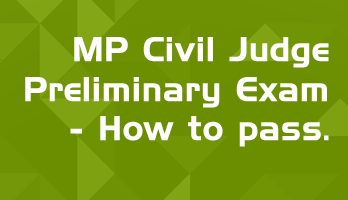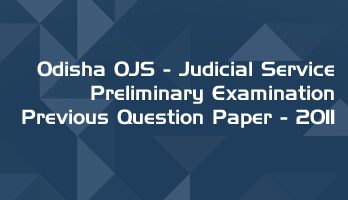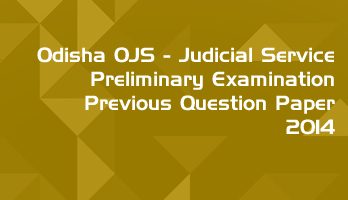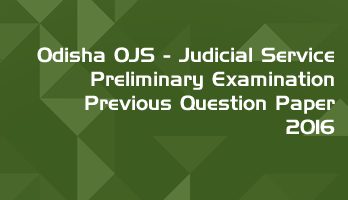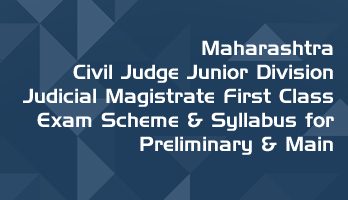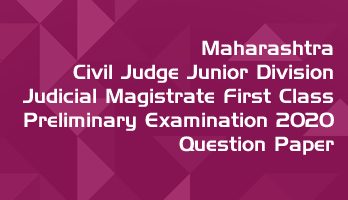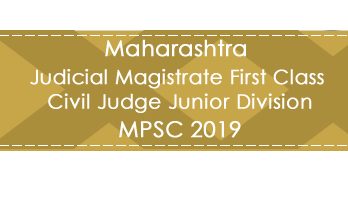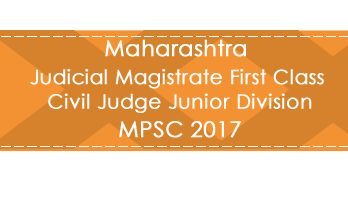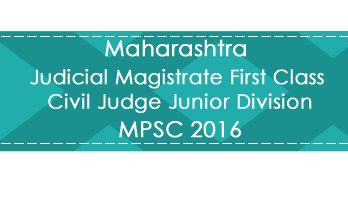Odisha OPSC OJS Judicial Prelims 2025 and 2026 - 155 Mock Tests & Previous Question Papers
- 100 Full Length Mock Tests - with unlimited practice
- 55 Topic wise Mock Tests covering all the topics in the syllabus
- Previous Question Papers - with official answer keys
- Downloadable PDF copies of all bare acts as per syllabus
- Database of over 15000+ MCQs
- Mock Tests designed as per latest syllabus and pattern
- Access valid for one year from date of purchase
- Questions & Answer Choices randomly shuffled in every attempt for better practice
- Accessible 24 x 7 via Smart-Phone browsers, Laptops, Desktops and Tablets
- This question paper, with official answer key is available on our Odisha OJS Preliminary Online Mock Test & Previous Question Papers Series.
- Unlimited access for one year from the date of purchase
- Mock tests are updated as per the latest pattern and syllabus
- See the links at the top to buy the online Odisha OJS Judicial mock tests
1. Indian Constitution is;
(A) Unitary
(B) Federal
(C) Quasi-federal
(D) None of the choices
2. The words ‘socialist’ and ‘secular’ were added in the Preamble of the Indian Constitution by the Constitutional Amendment.
(A) 42nd
(B) 32nd
(C) 25th
(D) 9th
3. “Equality of opportunity in matters of public employment” is provided under Article:
(A) 14
(B) 15
(C) 16
(D) 17
4. The President can make laws, when the Parliament is not in session by issuing:
(A) Orders
(B) Bills
(C) Ordinance
(D) Notification
5. In which of the following cases, the Supreme Court held that the Union Government cannot dismiss a duly elected State Government on the sole ground that the ruling party in the state suffered an overwhelming defeat in the election of the Lok Sabha?
(A) S, R. Bommai v. Union of India
(B) Karunanidhi v. Union of India
(C) Jayalalitha v. State
(D) None of the choices
6. The power of the Supreme Court of India to decide disputes between the Centre and the States falls under its;
(A) Advisory jurisdiction
(B) Appellate jurisdiction
(C) Original jurisdiction
(D) Constitutional jurisdiction
7. In which of the following cases, the Supreme Court used its power of Judicial review?
(A) Golaknath Case
(B) Bank Nationalization Case
(C) Minerva Mills Case
(D) All of the choices
8. The Supreme Court considered the scope of Freedom of speech and expression under Article 19(1)(a)for the first time in:
(A) Cross Roads Case
(B) K. A. Abbas Case
(C) Bandit Queen Case
(D) None of the choices
9. In which of the following Cases, Supreme Court held that right to legal aid is a Fundamental Right?
(A) Sunil Batra Case
(B) M. H. Hoskot Case
(C) Prem Shanker Shukla Case
(D) None of the choices
10. Reservation of seats for the Scheduled Castes and Scheduled Tribes in every Panchayat is provided under Article of Constitution of India.
(A) 243D
(B) 274D
(C) 275D
(D) 272D
11. In which of the following provisions ‘mesne profit has been defined in the Code of Civil Procedure?
(A) Section 2(4)
(B) Section 2(8)
(C) Section 2(12)
(D) Section 2(14)
12. Pecuniary jurisdiction of the court is contained in of Code of Civil Procedure.
(A) Section 6
(B) Section 7
(C) Section 8
(D) Section 9
13. Principle of res judicata applies to
(A) Suits only
(B) Execution proceedings only
(C) Arbitration proceedings only
(D) Suits as well as execution proceedings
14. Which of the following Section of the Code of Civil Procedure, 1908 deals with stay of suits?
(A) Section 9
(B) Section 10
(C) Section 11
(D) Section 12
15. A suit for the partition of immovable property, shall be instituted in the court within the local limits of whose jurisdiction the
(A) Property is situated
(B) Plaintiff resided
(C) Defendant resided
(D) Any of the choices
16. Which of the following provisions under the Code of Civil Procedure, 1908 deals with rejection of plaint?
(A) Order 7, Rule 7
(B) Order 7, Rule 8
(C) Order 7, Rule 10
(D) Order 7. Rule 11
17. Which of the following order deals with issue and service of summons?
(A) Order V
(B) Order VI
(C) Order VII
(D) Order IV
18. Defendant failed to file a written statement even after the stipulated time. The court pronounced the judgement. It is:
(A) Legal
(B) Illegal
(C) Justifiable
(D) Irregular
19. An application to set aside an ex parte decree shall be filed before
(A) The High Court
(B) The court which passed the decree
(C) The court to which an appeal lies from the decree
(D) None of the choices
20. In a suit by A against B, C and D, ex parte decree was passed, C and D were not served with summonses while B was served. In such a situation:
(A) Decree against all of them can be set aside
(B) Decree against B cannot be set aside
(C) Decree against all of them cannot be set aside
(D) None of the choices
21. An accused arrested can be kept in custody without producing him before the magistrate, after his arrest fora period of
(A) 12 hours
(B) 24 hours
(C) 48 hours
(D) 90 days
22. Section 41A, 41B, 41C and 41D were incorporated in the Code of Criminal Procedure, 1973 by:
(A) The Code of Criminal Procedure (Amendment) Act, 2005
(B) The Code of Criminal Procedure (Amendment) Act, 2006
(C) The Code of Criminal Procedure (Amendment) Act, 2008
(D) None of the choices
23. In which of the following cases, the Supreme Court held that ‘no arrest can be made because it is lawful for the police officer to do so. The existence of the power to arrest is one thing and the justification for the exercise of it is quite another. The police officer must be able to justify the arrest apart from his power to do so’?
(A) State of Gujarat v. Lal Singh
(B) Joginder Kumar v. State of UP
(C) Nandini Satpathy v. P. L. Dahi
(D) None of the choices
24. When a police officer files a report under Section 195(1)(a) of CrPC, it is known as a:
(A) Complaint
(B) Refer Report
(C) Police Report
(D) None of the choices
25. Offence for which, a police officer, has no authority to arrest without warrant is called a:
(A) Bailable offence
(B) Non-cognizable offence
(C) Non-compoundable offence
(D) None of the choices
26. The accused filed an application before the magistrate to allow him to appear through his power of attorney holder. The magistrate allowed the petition.-The order is:
(A) Legal
(B) Illegal
(C) Improper
(D) irregular
27. Executive Magistrates are appointed under of the Code of Criminal Procedure, 1973.
(A) Section 20
(B) Section 18
(C) Section 14
(D) Section 15
28. Which of the following Sections of the Code of Criminal Procedure, 1973 deals with conditional order for removal of nuisance?
(A) Section 133
(B) Section 134
(C) Section 135
(D) Section .136
29. Chapter XI of the Code of Criminal Procedure, 1973 deals with:
(A) Maintenance to wives, children and parents
(B) Maintenance of public order and tranquillity
(C) Preventive action of police
(D) None of the choices
30. A new proviso was added to Section 157(1) of the Code of (Criminal Procedure, 1973 by the Code of Criminal Procedure (Amendment) Act, 2008 in relation to an offence of:
(A) Murder
(B) Rape
(C) Terrorist Acts
(D) None of the choices
31. Which of the following Sections of the Indian Evidence Act deals with the relevancy of admissions and confessions?
(A) Sections 6 – 16
(B) Sections 17 – 31
(C) Sections 32 – 33
(D) Sections 34 – 39
32. Motive is insignificant when
(A) Direct evidence is available
(B) Direct evidence is not available
(C) Only circumstantial evidence is available
(D) None of the choices
33. An admission may be in nature.
(A) Oral
(B) Documentary
(C) Oral and Documentary
(D) Oral or documentary or contained in electronic form
34. In order to make the confession admissible, the person,
(A) May not be an accused at the time of making confession
(B) Must be an accused at the time of making the confession
(C) Must be a suspect at the time of making the confession
(D) None of the choices
35. In which of the following cases did the, Supreme Court held that a retracted confession can be used against the accused and it is not against Article 20(3) of the Constitution of India?
(A) Mubarak Ali v. State
(B) Palwinder Kaur v. State of Punjab
(C) Kalawati and another v. State of HP
(D) None of the choices
36. A and B are jointly tried for the murder of C. It is proved that A said, ‘B and I murdered C’. The court may consider the effect of this confession as against
(A) A only
(B) B only
(C) Both A and B
(D) None of the choices
37. Section 114 A was introduced by the Criminal Law Amendment Act, 1983, following the widespread protest against the judgement in the
(A) Mathura Case
(B) Vishakha Case
(C) Nartavati Case
(D) None of the choices
38. The examination of a witness by the party who calls him shall be called
(A) Re-examination
(B) Cross examination
(C) Examination-in-chief
(D) None of the choices
39. Previous judgments are relevant to support the plea of in civil cases.
(A) Res judicata
(B) Res-subjudice
(C) Limitation
(D) None of the choices
40. The contents of a document can be proved by :
(A) Primary evidence only
(B) Direct evidence only
(C) Primary or secondary evidence
(D) None of the choices
41. A, who knows swimming, failed to save the life of a drowning child and the child died as a result, of A’s omission.
(A) A is liable for not saving the drowning child
(B) A is not liable for not saving the drowning child
(C) Act is protected by general exceptions of the Indian Penal Code
(D) None of the choices
42. A person who consents, suffer no injury is known as:
(A) De minimis non curat lex
(B) Actus non facit reum nisi mens sit rea
(C) Volenti non fit injuria
(D) None of the choices
43. Which of the following Sections of the Indian Penal Code deals with right of private defence of the body and of the property?
(A) Section 98
(B) Section 96
(C) Section 97
(D) Section 99
44. A instigates B to murder D. B in pursuance of the instigation stabs D. D recovers from the wound:
(A) A is guilty of instigating B to commit murder
(B) A is guilty of attempt to murder
(C) A is not guilty since intended act did not happen
(D) None of the choices
45. Obstructing public servant in discharge of public functions is an offence punishable under of the Indian Penal Code.
(A) Section 186
(B) Section 187
(C) Section 188
(D) Section 189
46. A, knowing that B has murdered Z, assists B to hide the body with the intention of screening B from punishment. Under which of the following Sections of the Indian Penal Code can Abe punished?
(A) Section 200
(B) Section 201
(C) Section 202
(D) Section 203
47. A doctor registered as a medical practitioner and entitled to practice in Homoeopathy only, prescribed an allopathic medicine to the patient. The patient died. The doctor is guilty of:
(A) Death by rash and negligent act
(B) Murder
(C) Culpable homicide not amounting to murder
(D) None of the choices
48. Criminal Breach of Trust is defined under of the Indian Penal Code.
(A) Section 403
(B) Section 404
(C) Section 405
(D) Section 406
49. In which of the following cases, the Supreme Court held that legal and valid marriage is not a necessary ingredient to attract Section 498A of the Indian Penal Code?
(A) Reema Agarwal v. Anupam and others
(B) Sushil Kumar Sharma v. Union of India and others
(C) Arun Vyas v. Anita Vyas
(D) None of the choices
50. A makes an attempt to pick the pocket of Z by thrusting his hand into Z’s pocket. A fails in the attempt in consequence of Z’s having nothing in his pocket.
(A) A is guilty under Section 511 of the Indian Penal Code
(B) A is not guilty under Section 511 of the Indian Penal Code
(C) A is guilty of no offence
(D) None of the choices
Odisha OPSC OJS Judicial Prelims 2025 and 2026 - 155 Mock Tests & Previous Question Papers
- 100 Full Length Mock Tests - with unlimited practice
- 55 Topic wise Mock Tests covering all the topics in the syllabus
- Previous Question Papers - with official answer keys
- Downloadable PDF copies of all bare acts as per syllabus
- Database of over 15000+ MCQs
- Mock Tests designed as per latest syllabus and pattern
- Access valid for one year from date of purchase
- Questions & Answer Choices randomly shuffled in every attempt for better practice
- Accessible 24 x 7 via Smart-Phone browsers, Laptops, Desktops and Tablets
51. Which of the following Sections of the Limitation Act, 1963 deals with expiry of prescribed period when court is closed?
(A) Section 2
(B) Section 3
(C) Section 4
(D) Section 5
52. An order made on an application filed beyond the period of limitation is:
(A) Illegal
(B) Without jurisdiction
(C) Irregular
(D) None of the choices
53. In a suit for recovery of possession of a house from a deemed trustee of wakf property:
(A) No limitation applies
(B) Limitation is applicable
(C) Depends
(D) None of the choices
54. The period of limitation for filing an application for the execution of any decree (other than a decree granting a mandatory injunction) or order of any civil court is:
(A) 1 year
(B) 2 years
(C) 3 years
(D) 12 years
55. Exclusion of time under Section 14 is
(A) Mandatory
(B) Discretionary
(C) Directory
(D) None of the choices
56. Which of the following Sections of the Limitation Act, 1963 deals with the ‘Effect of substituting or adding new plaintiff or defendant?
(A) 21
(B) 22
(C) 23
(D) 24
57. In case of a suit for compensation for an act which does not give rise to a cause of action unless some specific injury actually results there from, the period of limitation shall be computed from the time:
(A) When the injury results
(B) When the act occurred
(C) Depends
(D) None of the choices
58. The jurisdiction to great exemption under Section 14 of Limitation Act, 1963 is given exclusively to:
(A) Civil Court
(B) High Court
(C) Supreme Court
(D) None of the choices
59. The period of limitation for a suit for compensation for infringing copyright or any other exclusive privilege is:
(A) 1 year
(B) 2 years
(C) 3 years
(D) 12 years
60. The period of limitation for filing an application to set aside a decree passed ex parte to rehear an appeal heard ex parte, is:
(A) 10 days
(B) 30 days
(C) 90 days
(D) 1 year
61. A vested interest created in favour of an unborn person comes under:
(A) Section 20
(B) Section 24
(C) Section 19
(D) None of the choices
62. Actionable claim means claim to any:
(A) Debt or beneficial interest
(B) Debt alone
(C) Beneficial interest, other than debt
(D) All of the choices
63. Doctrine of Election in the Transfer of Property Act, 1882 is provided under:
(A) Section 35
(B) Section 38
(C) Section 34
(D) None of the choices
64. The term ‘Transfer of Property’ is defined in the Transfer of Property Act, 1882 in:
(A) Section 3
(B) Section 5
(C) Section 2(a)
(D) Not defined in the Act
65. The registration of mortgage is not required where the mortgage is:
(A) Simple mortgage
(B) Anomalous mortgage
(C) English mortgage
(D) Mortgage by deposit of title deeds
66. Any provisions made as a clog on redemption is:
(A) Void
(B) Voidable
(C) Valid
(D) Enforceable
67. The lease of immovable property is terminable by either party by a notice of:
(A) 15 days
(B) 3 months
(C) 1 month
(D) 6 months
68. Puisne mortgagee is the:
(A) Assignee of the equity of redemption
(B) Co-mortgagee
(C) Subsequent mortgagee
(D) All of the choices
69. In a lease of immovable property what is transferred, is the:
(A) Interest in the property
(B) Right to enjoy the property
(C) Mesne profit
(D) Possession alone
70. Transfer of immovable property made with intent to defeat or delay the creditors of the transferor is known as:
(A) Feeding the grant
(B) Transfer lis pendens
(C) Fraudulent transfer
(D) Transfer by ostensible owner
71. The rule in Pinners Case relates to:
(A) Part performance
(B) Minor’s contract
(C) Fraud
(D) Undue influence
72. When an offer is addressed to the public at large, the offer is called:
(A) Advertisement
(B) Specific offer
(C) General offer
(D) Auction
73. X makes a proposal to Y, which Y accepts. But before the acceptance comes to the knowledge of X, Y revokes his acceptance by telegram. When is the revocation complete?
(A) When the telegram is despatched
(B) When the telegram is received by X
(C) When the contents of the telegram come to the knowledge of X
(D) When X accepts the revocation
74. ‘A’ threatened to commit suicide his wife and son if refused to execute a deed in his favour. They executed the deed. The deed is said to have been obtained by:
(A) Fraud
(B) Undue influence
(C) Coercion
(D) Misrepresentation
75. Wagering agreements are void but collateral transactions will be:
(A) Void
(B) Voidable
(C) Valid
(D) Valid, at the discretion of court
76. Owner of a cinema-hall contracts to exhibit a film in the month of October. In the month of September, the hall collapsed during an earthquake. The contract:
(A) Is valid and binds the owner of the cinema-hall to exhibit the film
(B) Is not frustrated
(C) Has become impossible to perform
(D) Has to be honoured and so the owner should reconstruct the hall to exhibit the film
77. If a person accepts a lesser sum of money than what was contracted for a discharge of the whole debt, it is known as:
(A) Remission
(B) Alteration
(C) Rescission
(D) Waiver
78. Under English law a contract of insurance other than life insurance is :
(A) Contract of agency
(B) Contingent contract
(C) Contract of guarantee
(D) Contract of indemnity
79. The leading case Carlill v. Carbolic Smoke Ball Co, relates to:
(A) Capacity of parties
(B) Minor’s agreement
(C) General offer
(D) Tender
80. ‘Consensus ad idem’ means:
(A) Consent of the parties obtained illegally
(B) Parties identified the same thing in the same sense
(C) Contract between the same parties
(D) Contract without consent
81. Distribution of property among heirs in Class II of the Schedule under Section 11 shall be divided between them:
(A) One share
(B) Equally
(C) 1/3rd share
(D) 1/4th share
82. Who among the following is a Class – 1 heir?
(A) Brother’s son
(B) Sister’s son
(C) Brother’s daughter
(D) None of the choices
83. Coparcenary is
(A) A creature of Hindu law
(B) Created by agreement between parties
(C) Created by act of parties
(D) None of the choices
84. A person who dies without making testamentary disposition in respect of his property under Section 3(g) is :
(A) Coparcener
(B) Intestate
(C) Testator
(D) Legatee
85. General rules of succession in the case of the succession of the female Hindus are dealt with under
(A) Section 16
(B) Section 20
(C) Section 21
(D) Section 15
86. A widow inherits property of her husband on his death. Whether a subsequent re-marriage would divest her of property in view of Section 24 and Section 14 of the Hindu Succession Act, 1956?
(A) Yes
(B) No
(C) Depends
(D) None of the choices
87. One who shares (equally) with others in inheritance in the estate of a common ancestor is called a
(A) Cognate
(B) Coparcener
(C) Agnate
(D) None of the choices
88. As per Section 14 of the Hindu Succession Act, 1956 any property possessed by a female Hindu, whether acquired before or after the commencement of the Act shall be held by her as
(A) A full owner
(B) A limited owner
(C) Joint owner
(D) None of the choices
89. Which Section of the Indian Succession Act, 1925 defines codicil?
(A) Section 2(f)
(B) Section 2(a)
(C) Section 2(b)
(D) Section 2(h)
90. A will or any part of a will, the making of which has been caused by fraud or coercion or by such importunity is:
(A) Valid
(B) Void
(C) Voidable
(D) None of the choices
91. The specific performance of any contract specified in Section 10 of the Specific Relief Act may be enforced
(A) As of right
(B) As per discretion of court
(C) Mandatorily
(D) None of the choices
92. What is the period of limitation fixed for filing a suit for specific performance of a contract?
(A) 2 years
(B) 3 years
(C) 7 years
(D) 14 years
93. Which of the following Sections of the Specific Relief Act deals with specific performance of part of contract?
(A) Section 12
(B) Section 13
(C) Section 14
(D) Section 15
94. In which of the following cases has the Supreme Court held that when granting of damages is an adequate relief, the specific performance would be refused?
(A) Prakash Chandra v. Angadlal
(B) Maria v. Bilkees
(C) Chand Rani v. Kamal Rani
(D) None of the choices
95. A party who has rescinded a contract
(A) Can recover damages
(B) Cannot recover damages
(C) Depends
(D) None of the choices
96. In a suit for specific performance of a contract, the plaintiff may also claim compensation for its breach
(A) In addition to such performance
(B) In substitution of such performance
(C) Either in addition to or in substitution of such performance
(D) None of the choices
97. A declaration made under Section 34 is binding on
(A) The parties of the suit
(B) Persons claiming through them respectively
(C) Where any of the parties are trustees, on the persons, for whom, if in existence at the date of the declaration, such parties would be trustees
(D) All of the choices
98. Perpetual injunction is defined in Section of the Specific Relief Act.
(A) Section 36
(B) Section 37
(C) Section 38
(D) Section 39
99. A party can file a suit for rectification
(A) At any time when fraud is discovered
(B) At any time a mistake has come to light
(C) Within three years of execution of instrument
(D) Either at the time when fraud is discovered or any time a mistake has come to light
100. Which of the following contracts cannot be specifically enforced?
(A) A contract for the non-performance of which compensation in money is an adequate relief
(B) A contract which runs into such minute or numerous details
(C) A contract which is in its nature determinable
(D) All of the choices
- This question paper, with official answer key is available on our Odisha OJS Preliminary Online Mock Test & Previous Question Papers Series.
- Unlimited access for one year from the date of purchase
- Mock tests are updated as per the latest pattern and syllabus
- See the links below to buy the online Odisha OJS Judicial mock tests
Odisha OPSC OJS Judicial Prelims 2025 and 2026 - 155 Mock Tests & Previous Question Papers
- 100 Full Length Mock Tests - with unlimited practice
- 55 Topic wise Mock Tests covering all the topics in the syllabus
- Previous Question Papers - with official answer keys
- Downloadable PDF copies of all bare acts as per syllabus
- Database of over 15000+ MCQs
- Mock Tests designed as per latest syllabus and pattern
- Access valid for one year from date of purchase
- Questions & Answer Choices randomly shuffled in every attempt for better practice
- Accessible 24 x 7 via Smart-Phone browsers, Laptops, Desktops and Tablets


